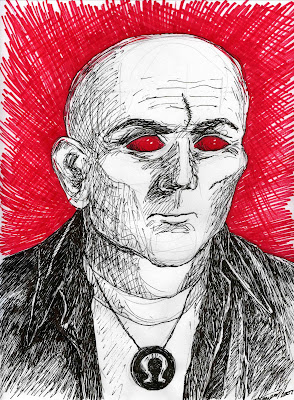For those readers who are interested in reading further about the places, peoples and histories that Drake will be discussing in his posts, these supplementary posts will provide lists of reference links and books where further information can be found.
I will keep these posts brief and relatively infrequent, unless there is a demand for more.
Wikipedia is a good (but not necessarily the most accurate) source that is freely available so many links will be to articles on that site where readers who have an even deeper interest can find other sources quoted that they can access if they so choose.
The first link that I am providing is to the Wikipedia article on the city of Ur...
http://en.wikipedia.org/wiki/Ur
One should note that the quoted dates of prominence for Ur are later than Drake's claimed age...he states that he is 6,000 years old (meaning he would have been born at approximately 4000 BCE), while most sources state that Ur didn't rise to any level of prominence until at least several hundred years later, sometime around 3300 BCE.
Here is a link to the period of time in that region to which Drake is claiming to have been born:
http://en.wikipedia.org/wiki/Chalcolithic
It is called the Chalcolithic Period, which is sort of a transition time in Asia between the Neolithic (stone age) and the Copper Age.
Finally, for this premier edition of 'Readings in Drakeology', I have two more items. The first is a good book where I have been able to find many of the things that Drake speaks about in:
Magick of the Gods and Goddesses by D.J. Conway, 2003, The Crossing Press.
In the first post by Drake, he mentions the name for his father's 'people', the An'girasii.
In my readings of DJ Conway, I came across a reference on page 384 that uses a very similar word: 'angiras' a Sanskrit word meaning 'a divine spirit' that may have been the basis for the Persian word, 'angaros' meaning 'courier' and the Greek words 'angelos' and 'daimon'. This was all used in the discussion by author Conway to explaain the origin of the word 'angel' in English and 'malakh' in Hebrew.
If Drake is indeed correct, then perhaps the Sanskrit word is derived from the An'girasii name for themselves, which according to Drake, means 'the Chosen'.
Future posts by Drake will discuss the An'girasii and their claimed origins and influence on the development of humanity much more.
So I will leave you with a couple more links to Wikipedia, the first of these is the entry for 'angiras' and the following ones are hints at where Drake's narrative will take us in his next few posts (each Sunday he will get to make another post, circumstances permitting).
http://en.wikipedia.org/wiki/Angiras
http://en.wikipedia.org/wiki/Lothal
http://en.wikipedia.org/wiki/Harappa
Enjoy!
Monday, October 30, 2006
Subscribe to:
Comments (Atom)



